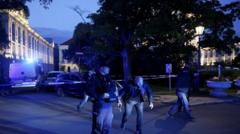In Wroclaw, Poland, civilians are signing up for military training to be ready in case of a Russian attack. While the government plans to expand training for all adult males, concerns about security deepen amid geopolitical tensions and shifting alliances.
Ordinary Poles Prepare for Potential Russian Aggression

Ordinary Poles Prepare for Potential Russian Aggression
As tensions rise, many Poles are engaging in military training to bolster the nation's defense capabilities against a possible Russian invasion.
At a military training facility outside Wroclaw, a growing number of Polish citizens are taking matters into their own hands by participating in military training sessions, eager to learn how to defend themselves and their country. As the threat from Russia looms larger, civilians of all ages are lining up to handle firearms and receive guidance from real soldiers, exemplified by a Polish instructor sternly directing participants on weapon handling.
The Saturday morning initiative, aptly named "Train with the Army," begets participants with essential skills, from shooting to first aid and even hand-to-hand combat. Project coordinator Captain Adam Sielicki notes the program's overwhelming popularity, which has led the government to consider broadening it so that every adult male can receive military training. With military spending rising to nearly 5% of the GDP, Poland is poised to fortify its defense capabilities, marking a significant commitment as it sits on the borders of both Russia and Ukraine.
Prime Minister Donald Tusk has underscored the urgency, proclaiming aspirations for Poland to have the "strongest army in the region," as the nation invests heavily in military hardware from international allies, including the U.S. and South Korea. Attendees like Dariusz are motivated to prepare for potential conflict, asserting their readiness to volunteer if necessary, while others express anxiety about relying solely on international alliances.
Recent fluctuations in U.S. military commitments have stirred feelings of vulnerability among Poles. The withdrawal of troops from key bases, coupled with the high-profile remarks of U.S. leaders, has led many to seek alternative security measures. Defense officials are looking at forging new defense agreements with nations like France and the UK, emphasizing the need to rethink security strategies.
The memories of past Russian aggression weigh heavily in Polish society, with individuals like Wanda Traczyk-Stawska, a veteran of the Warsaw Uprising, recalling the fears of the past. With her experiences firmly in mind, she supports the military buildup, illustrating a collective desire to avoid a repeat of history.
While there is significant enthusiasm for preparation, a recent poll suggests mixed feelings about participation in defense efforts; fewer individuals express readiness to fight if conflict arises. Encounters with younger demographics reflect a notable hesitation, as some express a desire to flee rather than engage.
In contrast, interest in personal preparedness measures, like bomb shelters, has surged, indicating an underlying apprehension regarding national security. Entrepreneurs in areas like southern Poland report a spike in inquiries about safe housing due to fears of Russian aggression.
The looming question remains—are Poles truly prepared to defend their homeland against potential threats? As debate and concern continue to swirl, one thing is clear: ordinary citizens in Poland are readying themselves for whatever the future may hold.





















